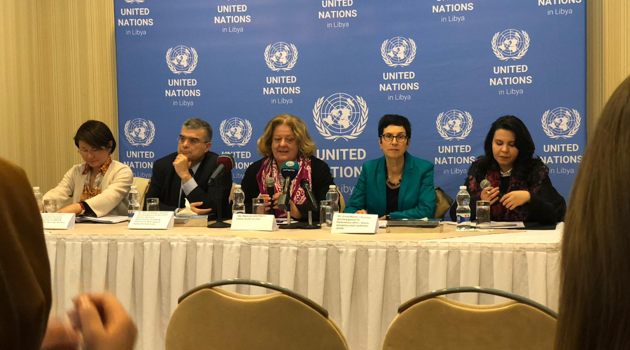UN humanitarian, development chiefs join forces towards Libya recovery from crisis
Concluding a four-day mission to Libya and Tunisia, United Nations Development Programme (UNDP) Director of the Regional Bureau for Arab States, Mr. Mourad Wahba, the Director of the UNDP Crisis Bureau, Ms. Asako Okai, and the United Nations Deputy Emergency Relief Coordinator (OCHA), Ms. Ursula Mueller, called on Government, and national and international stakeholders to address people’s urgent need for life-saving assistance and support recovery and stabilization in Libya linking humanitarian and development actions.
“What we witnessed in Tripoli is disheartening,” said Ms Mueller. “Doctors in public hospitals lack the medical supplies they need to treat patients. Tens of thousands of displaced people have been living in overcrowded shelters, sharing public bathrooms and kitchens. Thousands of migrants of various nationalities are kept in unspeakable conditions in congested detention centers. We saw the damage the conflict has caused to the lives of people, but also the resilience they have demonstrated. The United Nations and partners are committed to support the people of Libya wherever they are, despite the insecurity and access constrains that hamper their work.”
Accompanied by the Deputy Special Representative of the Secretary-General and United Nations Resident and Humanitarian Coordinator for Libya, Ms. Maria do Valle Ribeiro, they travelled together to both countries to reiterate the continuous support of the United Nations towards a peaceful transition in Libya.
Concluding a four-day mission to Libya and Tunisia, United Nations Development Programme (UNDP) Director of the Regional Bureau for Arab States, Mr. Mourad Wahba, the Director of the UNDP Crisis Bureau, Ms. Asako Okai, and the United Nations Deputy Emergency Relief Coordinator (OCHA), Ms. Ursula Mueller, called on Government, and national and international stakeholders to address people’s urgent need for life-saving assistance and support recovery and stabilization in Libya linking humanitarian and development actions.
“What we witnessed in Tripoli is disheartening,” said Ms Mueller. “Doctors in public hospitals lack the medical supplies they need to treat patients. Tens of thousands of displaced people have been living in overcrowded shelters, sharing public bathrooms and kitchens. Thousands of migrants of various nationalities are kept in unspeakable conditions in congested detention centers. We saw the damage the conflict has caused to the lives of people, but also the resilience they have demonstrated. The United Nations and partners are committed to support the people of Libya wherever they are, despite the insecurity and access constrains that hamper their work.”
Accompanied by the Deputy Special Representative of the Secretary-General and United Nations Resident and Humanitarian Coordinator for Libya, Ms. Maria do Valle Ribeiro, they travelled together to both countries to reiterate the continuous support of the United Nations towards a peaceful transition in Libya.
“The United Nations is here to support the Government and people of Libya,” said Mr. Wahba. “We witnessed firsthand the challenges Libyan women and men are facing, the work that the Government is doing to address needs, and the support our colleagues on the ground are providing. We will continue working with the Government to support a political foundation for longer-term inclusive and sustainable development. Addressing the needs of Libyans in a sustainable manner requires an investment in development through enhancing the capacities of authorities to deliver services to all citizens, reinforce local peace deals and boost municipal capacities.”
Humanitarian and development partners are linking up efforts in Libya to provide immediate support to affected communities in Libya, to help prevent new humanitarian needs, and to address structural and economic impacts across the country.
(Source: UNDP)





